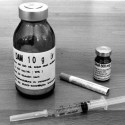Analysis of alcoholics' brains suggests treatment target
An analysis of brain tissue samples from chronic alcoholics reveals changes that occur at the molecular level in alcohol abuse – and suggests a potential treatment target, according to researchers from Wake Forest University School of Medicine.
Reporting in Alcoholism: Clinical and Experimental Research, the scientists said that a protein known as beta-catenin that is involved in cell signaling and development is found at higher levels in the brains of chronic alcoholics compared to people of the same age with no history of alcoholism.
The results were reported online this week and will appear in the June print issue.
“We have identified a protein that may be a cause of alcohol dependence and tolerance, suggesting the possibility of developing a drug to inhibit the molecule and treat the disease,” said Qiang Gu, Ph.D., senior author.
Gu and colleagues used cutting-edge technology to explore the idea that the complex behavioral, psychological, emotional and brain changes associated with alcoholism are likely due to how networks of proteins respond to chronic and excessive alcohol intake. Proteins, which are manufactured by genes, determine how an organism looks, how well its body metabolizes food or fights infection, and even how it behaves.
Using a newly emerging tool to study proteins, called antibody microarray analyses, Gu and colleagues are able to measure levels of more than 500 different proteins in tissue samples. In a pilot study, they noted that beta-catenin was increased in alcoholics, so they studied it in more detail. In the current study, they evaluated levels of 17 proteins associated with the catenin signaling pathway.
“This is a powerful tool for examining the abundance of large numbers of proteins simultaneously,” said Gu, an assistant professor of neurobiology and anatomy.
He cautioned that more research is needed before scientists can use the information to develop a potential treatment. He said a next step is to study animals to determine exactly when levels of beta-catenin increase.
“If the change happens early, it may explain how the brain adapts and could be a potential treatment target,” he said. “If it shows up later, it could be from the toxic effects of alcohol. We need to further define its role.”
The researchers studied postmortem brain tissue samples from 14 male chronic alcoholics and 14 age-matched male individuals with no history of alcohol abuse. The samples were from the superior frontal cortex, an area of the brain associated with alcohol abuse that is a part of the brain pathway that involves feelings of desire and reward.
“This protein may play a role in the reward circuitry,” said Gu. “If that is true, a drug to block these effects could reduce dependence on alcohol.”
In addition to their findings about beta-catenin, the scientists also found higher levels of Myc, a protein that at high levels can cause a transformation of cells that leads to cancer. The findings could help explain a link between alcohol and cancer.
“The results may help to explain why excessive alcohol consumption increases the risk of cancer,” said Gu. “While an association has been established between alcohol consumption and various cancers, the mechanism remains obscure. Because the production of Myc in the cell is regulated by beta-catenin, our findings may suggest that alcohol activates beta-catenin production; that in turn activates Myc production, and that ultimately leads to cell transformation and cancer.”


